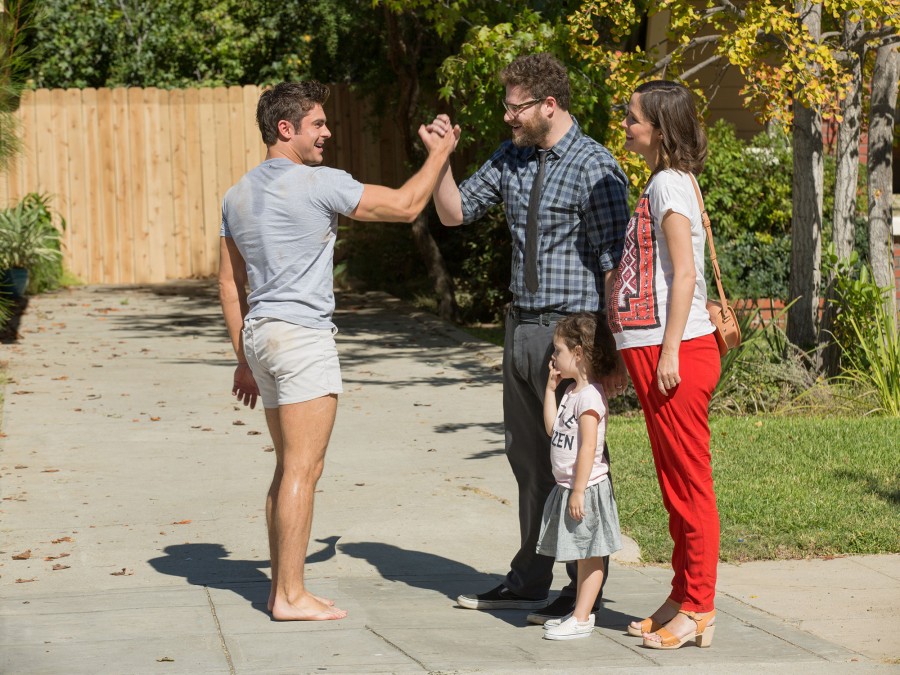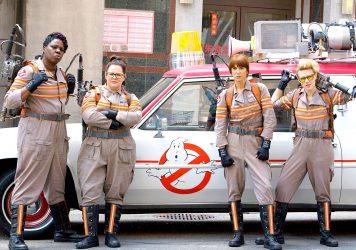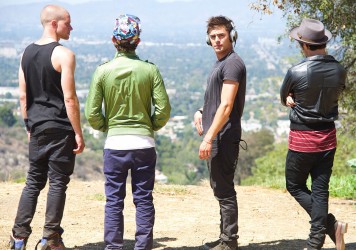A surprising entrant to that very exclusive club of movie sequels that are better than the original.
In a mind-blowing opening gambit, Bad Neighbours 2 begins with the real life revelation that in the US, sororities are not allowed to throw their own house parties – only fraternities can. This backward little frat factoid offers the filmmakers a thematic and comedic goldmine, bringing to the fore an urgency and topicality that was sorely missing from the first instalment in the franchise. Here, a bunch of sorority girls fight for their right to party and are thus pitted against the exhausted couple at the centre of the first film – Seth Rogan and Rose Byrne. Fortunately, there’s way more at stake this time.
The first film certainly offered plenty of opportunity to bring some level of satirical scrutiny to the concept of the frat house, to query their existence and question their relevance in a supposedly progressive world. It’s hard to imagine the existence of Zac Efron’s dudebro frat, for instance, in the metrosexual, self-aware youth communities from Phil Lord and Chris Miller’s 21 and 22 Jump Street. It simply and disappointingly didn’t engage with those possibilities.
This refusal to engage was designed to make the film funnier. That a new family of grown-ups living next door simply have to accept the presence of this aberrantly backwards company of hard-partying bros and ‘just deal with it’ was supposed to be hilarious. It wasn’t. Yet, even though it falls back on basic LOLs and broad slapstick – despite occasional frissons of sexual and gender unease – Bad Neighbours celebrated its dudes.
There is then something doubly exciting about Bad Neighbours 2. An early sequence shows a frat party from the point of view of a girl who refuses to participate in its blatant sexism. We’ve toured this space so often before with wide-eyed, delighted dude eyes and dude gaze in a thousand terrible teen movies. Seeing it this time from a largely ignored and necessarily disgusted perspective is all the more thrilling because it unexpectedly occurs within a franchise that never once hinted at such levels of self-criticism and self-awareness.
In among the gross out, the drug gags and culture clash comedy familiar from the first instalment, this sequel suddenly asks genuinely interesting questions about the mind boggling situations it completely ignored previously. Taking viewers seriously in this way is certainly a risky and bold move for a commercial Hollywood comedy that began as a bald celebration of frat culture. But it’s what makes the film relatable and exciting, something that no mention of Al Pacino’s ‘whoo ha’ in 1992’s Scent of a Woman, or couch conversations about Batman, could possibly do the first time around.
The fact the first film did not address sexism at all works in the service of the second. The feminism of the returning male characters – principally Rogen and Efron – appears as a genuine desire to do better rather than an urgent and anxious change of heart. At one point Rogen’s Mac chides best mate Jimmy (Ike Barinholtz) for calling a ‘Men’s Rights’ fist bump during an argument. His ‘Fuck you’ feels real in a way that’s almost moving in its offhand sincerity.
But this is the general mood and tone of the film as a whole. A subplot about Dave Franco’s Pete and his latent homosexuality in the first film, which here has transformed into him marrying his gay lover, is treated similarly as neither an issue, nor a source of any real comedy in the film. It’s just simply there to deepen the characters. Moreover, seeing a roomful of dudes shouting ‘USA! USA!’ as their male friends make out feels almost euphoric.

One lengthy sequence has sorority ringleader Chloë Grace Moretz’s Shelby giving blunt examples of the sexism of frat parties to Zac Efron’s Teddy Sanders. Teddy does not fight back, but instead admits his carelessness and moves on to better things. Thankfully, all the sexism and feminist talk in the film is not portrayed as a life-changing, righteous, humbling or humiliating experience for our main dude but, disarmingly, as the most natural thing – just another part of his necessary arc of maturation. This is because the film does not portray sexism as the work of a few evil men, but rather as a systemic problem, an old unquestioned habit taught by society to men throughout their lives, and especially in college. Look out for a tremendously witty play on the ‘hoes’ fixation at college parties and you’ll spot the film’s thesis in a single joke.
But this systemic sexism goes for girls too, and the film is most interesting and thrilling when it fearlessly demonstrates that they too have to change their behaviour. Teddy’s new purpose as an ally for the girls who plan to organise their own feminist sorority highlights the ways in which systemic sexism also works to undermine their attempts to emancipate themselves. This attitude of utopian equality between Teddy and the girls is reminiscent of, yes, Gregory Jacobs’ Magic Mike XXL. A comparison made even more obvious in a great male dance sequence that can only be read as a conscious homage to our favourite commercial feminist film yet. Who would have thought that the sequel to a broad Seth Rogen frat comedy could ever be worth mentioning in the same sentence as that absolute gem of progressive filmmaking?
But is it funny? The film’s concern with serious issues makes for truly exciting and touching moments of introspection and forgiveness. But it also makes way for a torrent of crass, intelligent and delightful jokes. Beyond the film’s principal concern with exploring young women’s problems with edgy comedy, Jerrod Carmichael – a revelation here – shines as a living commentary on both the ‘black best friend’ trope and American police brutality. There are empty fart jokes, of course, but the ambition of the film’s discourse makes its humour reach levels never once aspired to in the previous film. The film’s genuine good-heartedness takes these problematic jokes for what they are: problematic jokes. It handles them perfectly.
With so much happening with the girls and Teddy Sanders, the film at times neglects the characters positioned as central in the first film, namely the young couple played by Rogen and Byrne. While the first film played with the tension between their parenting and their desire to party, this is almost completely dropped here as partying is no longer portrayed as something stupid, but rather as a celebration of feminism. Their recurring concern is, instead, anxiety about being good parents, which is well handled but rather repetitive. A non-issue, to be honest. But these are only really minor quibbles in a film that’s alive with ideas – funny, refreshing, compassionate.
Published 5 May 2016
The first instalment of the franchise was mind numbing and depressing.
Only a few minutes in and you realise that this is another deal entirely.
Can’t stop thinking about it.

Ho-ho-hell no. This seasonal caper starring Seth Rogen is about as funny as Christmas cracker gag.

Paul Feig’s all-female reboot is not quite the victory for gender equality it may appear.

Disposable portrait of an EDM artist in ascent with a very genial Zac Efron in the lead.